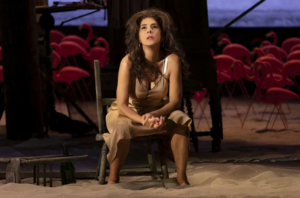Review Roundup: Marisa Tomei Stars In Tennessee Williams' THE ROSE TATTOO - See What The Critics Are Saying!
|

Roundabout Theatre Company's new Broadway production of The Rose Tattoo officially opens tonight, October 15, 2019, at the American Airlines Theatre.
The Rose Tattoo stars Cassie Beck as "Miss Yorke," Alexander Bello as "Salvatore," Tina Benko as "Estelle Hoehengarten," Andréa Burns as "Peppina," Susan Cella as "Giuseppina," Emun Elliott as "Alvaro Mangiacavallo," Paige Gilbert as "Bessie," Greg Hildreth as "The Salesman," Isabella Iannelli as "Vivi," Jacob Michael Laval as "Bruno," Ellyn Marie Marsh as "Violetta," Carolyn Mignini as "Assunta," Portia as "Flora," Ella Rubin as "Rosa," Jennifer Sánchez as "Mariella," Constance Shulman as "The Strega," Burke Swanson as "Jack," and Marisa Tomei as "Serafina."
This is one Tennessee Williams woman you won't soon forget. Marisa Tomei plays Serafina, a widow who rekindles her desire for love, lust and life in the arms of a fiery suitor. Sharply directed by Cullman, Williams' lesser-known gem sizzles with humor and heart in sultry New Orleans. Serafina erupts from the depths of despair to the heights of passion in this Tony Award-winning Best Play.
Ben Brantley, The New York Times: Tomei knows from Italian-flavored portraiture. (She won an Oscar playing a character named Mona Lisa Vito in "My Cousin Vinny.") If, in the closefitting 1950s slips and dresses the costume designer Clint Ramos has provided, her affect is more cuddly pixie than temperamental colossus, she is nonetheless a bold and inventive comic performer. Unfortunately, she is in hard-fought competition with her environment. It's not that she's operating in a vacuum, which might be easier. Cullman has populated the stage with an ever-present chorus of singing Italian women and frantic children.
Michael Dale, BroadwayWorld: The casting of Marisa Tomei, an accomplished stage actor who is no stranger to finding authentic humanity in a quirkily altered reality (i.e., her last two New York turns in Sarah Ruhl's HOW TO TRANSCEND A HAPPY MARRIAGE and, oddly enough, Will Eno's THE REALISTIC JONESES), is the first. But this ain't no Streetcar or Glass Menagerie. The Rose Tattoo, Williams' 1951 offering which is returning to Broadway for the third time by way of a production that originated three summers ago at Williamstown Theatre Festival, is about as close as the playwright ever came to romantic comedy, and director, star and a very strong ensemble cast bring out the operatic flourishes of sorrow. joy, and even a little madness, in this tale of a grief-stricken Sicilian immigrant widow living on the Gulf Coast who finds fulfilling passion once again.
Adam Feldman, Time Out New York: The Rose Tattoo gets much more pleasurable as it opens into bloom. Tomei is not ideally cast as Serafina-her lightness works against her-and the first act is thick with Italian accents and gesticulation. (You half expect someone to step forward and say, "Mama mia, that's a spicy drama!") Trip Cullman's staging seems to lean into the potential for camp; the back half of Mark Wendland's abstract set is crowded with dozens of lawn-ornament pink flamingos, and Tina Benko, as Rosario's mistress, looks and acts like a human pair of scissors. But Tomei's great talent for romantic comedy clicks into place in her flirtation with Mangiacavallo. Although the tone of the play and production waver too much to leave a permament impression, The Rose Tattoo has an interesting place in the Williams canon. There is no shortage, in his plays, of lustful, delusional women who fall for attractive younger men. But rarely do they have, as here, even the hope of a happy ending.
Greg Evans, Deadline: As for the fates of the rest, well, romantic comedy wasn't exactly Williams' wheelhouse. He plays by its rules sure enough, even giving Serafina and Alvaro a shot at happiness rare in his universe, but all the effort feels like, well, effort, febrile and verbose and matched shout for shout, sob for sob by a production that could have used a little of the restraint Cullman showed with Choir Boy or Lobby Hero. If happily ever after is better than a shattered glass unicorn or getting carted off to the neighborhood loony bin, it probably shouldn't feel less fun.
Entertainment Weekly: Making his Broadway debut as Alvaro, Scottish actor Emun Elliott (The Paradise, Game of Thrones) matches Tomei with a similarly energetic performance. Though he doesn't appear until the play's second act, he and Tomei have a natural chemistry that helps bridge the question of why Serafina would be so attracted to a man of Alvaro's somewhat questionable character. While they make an appealing pair, sometimes their mutual mugging goes a little overboard and distracts from the sense of romance that should be building between the two.
David Rooney, The Hollywood Reporter: Marisa Tomei's earthy performance as half-crazed Sicilian American widow Serafina Delle Rose is the main attraction in Trip Cullman's maddeningly uneven production, first seen in 2016 at the Williamstown Theatre Festival with a mostly different supporting cast. Tomei emotes up a storm more brooding even than the clouds billowing over the Louisiana Gulf Coast in Lucy Mackinnon's atmospheric wraparound projections. But director Cullman has no feel for the tricky brew of pathos, passion, poetry, humor and clunky symbolism required of this second-tier Williams work. Instead, it's shrill and hysterically over the top, poorly paced and blighted by some very large Italianate acting with all the authenticity of an Olive Garden chicken alfredo. Troppo is the word that comes to mind.
Melissa Rose Bernardo, New York Stage Review: Perhaps removing the less-significant male characters is supposed to focus more squarely on the blossoming parallel love stories: the awkward, oh-so-idealistic teenage pairing of Rosa and Jack, and the awkward, cynical, mature coupling of Serafina and Alvaro. But sometimes the sauce just doesn't come together.
David Finkle, New York Stage Review: But with Tomei, the Williams heartbreak is elusive. She looks the neighborhood scourge in costume designer Clint Ramos's slips and robes and Tom Watson's wigs, but the debilitating weight of her loss and the fear that it won't be regained is not in her eyes or in the effortful way she carries herself. Tomei is effective as far as she goes, and it's likely she has it in her to go much farther. But she hasn't been guided that way.
Alexis Soloski, The Guardian: Past productions have starred actors with a heft of gravitas - Anna Magnani, Mercedes Ruehl, Maureen Stapleton - women who may have given the gags somewhere weightier to land. Tomei is a lighter, flightier presence - sensuous and delightful - and she plays even the darkest moments brightly, in on the joke. She and Elliott have great fun together, but they don't sell sex as life-affirming. It looks effortful and cheap. The whole cast screams and flails and races around Mark Wendland's set, which scrambles any sense of indoors and outdoors in something like an org*smic frenzy. The plastic flamingos look on, unmoved.
Tim Teeman, The Daily Beast: Maybe the rosy-colored flamingoes are an echo of this too, this warm throbbing color of life and promise. Whatever, Elliott and Tomei play their stuttering progress to romance with both flare and sensitivity, as well as for belly laughs. She wants to do something but can't. He wants to respect her space but isn't sure she wants him. And their body language tells the audience everything about how hot they are for each other.
Chris Jones, Chicago Tribune: Remarkably, you believe Tomei throughout. Most Sarafinas I have seen have nailed one or the other; Tomei, never contained by either, gets them both. It's a remarkable picture of restlessness and need, and reason enough to see Cullman's staging, which also leans wryly into the comedy of the piece, even to the point of including a bunch of pink flamingos in a rich setting from Mark Wendland that shrewdly suggests the immigrant's need to replicate their homeland, even as American visual banality shoots that desire in the foot.
Roma Torre, NY1: "The Rose Tattoo" is an anomaly among Tennessee Williams' great dramas. Despite the fact that it concerns a protagonist newly widowed, it's essentially a romantic comedy, a genre Williams was never really known for, but he came up with this charmingly spirited story after returning from a getaway in Sicily with his lover and was said to be floating on a romantic high. It's still far from his best, and it really only hits the mark when the lead performances are strong and the production is tightly focused. This time around, they got it only half right.
Marilyn Stasio, Variety: "The Rose Tattoo" is what happens when a poet writes a comedy - something strange, but kind of lovely. The same might be said of director Trip Cullman's production: Strange, if not exactly lovely. Even Marisa Tomei, so physically delicate and expressively refined, seems an odd choice to play the lusty and passionate protagonist, Serafina Delle Rose. She, too, is kind of lovely - if lost.
Joe Dziemianowicz, Theater News Online: Laced with humor and colorfully loopy characters and an ending - no spoiler - that is atypically upbeat, The Rose Tattoo is as close as Tennessee Williams comes to romantic comedy. The miscalibrated new Broadway production at American Airlines Theatre starring Marissa Tomei provides a telling reminder of the limited elasticity of comedy. Stretched too broadly and the whole business can warp. Stakes aren't raised; they're razed. As a result, poignance goes untapped in a 1951 award-winning play that's more than two and a half hours of easy laughs.
Christopher Bonanos, Vulture: None of this, mind you, is a total mess. Individual scenes are affecting, Tomei can toss off a funny line with the best of them, and you are, by the end, rooting for Serafina to find happiness again. Ella Rubin, as her daughter, Rosa, has an unexpectedly modern role to play-she's a teenager of 15 who really wants to get with her reticent older boyfriend-and she too has stage presence to burn. Tomei looks great, and the costuming does well by everyone. (The script includes a few remarks about the degree to which Serafina has gone to seed, but you'll just have to take that on faith.)
Videos
